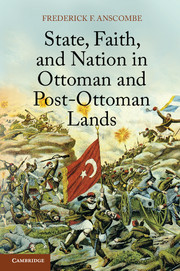Book contents
- Frontmatter
- Dedication
- Contents
- List of Maps and Images
- Acknowledgments
- Transliteration and Abbreviations
- Maps
- Introduction
- Part I The Ottoman Empire
- Part II From Ottoman to Post-Ottoman States
- 6 The Post-Ottoman Balkans
- 7 Post-Ottoman Turkey
- 8 The Post-Ottoman Arab Lands
- Part III Contemporary Post-Ottoman States
- Conclusion State, Faith, and Nation
- Bibliography
- Index
- References
7 - Post-Ottoman Turkey
Published online by Cambridge University Press: 05 June 2014
- Frontmatter
- Dedication
- Contents
- List of Maps and Images
- Acknowledgments
- Transliteration and Abbreviations
- Maps
- Introduction
- Part I The Ottoman Empire
- Part II From Ottoman to Post-Ottoman States
- 6 The Post-Ottoman Balkans
- 7 Post-Ottoman Turkey
- 8 The Post-Ottoman Arab Lands
- Part III Contemporary Post-Ottoman States
- Conclusion State, Faith, and Nation
- Bibliography
- Index
- References
Summary
Viewed from today, Turkey’s construction from the rubble of the Ottoman empire appears to have been a natural step, given Istanbul’s loss of its remaining “non-Turkish” provinces in Europe (Albania, Macedonia, and western Thrace), Asia (the Dodecanese islands, Iraq, eastern and western Arabia, Transjordan, Palestine, and Lebanon), and Africa (Libya, Egypt, and Sudan) between 1911 and 1918. The twelfth of Woodrow Wilson’s famous fourteen points that provided an ostensible blueprint for reshaping the world after the Entente’s victory in 1918 called for secure sovereignty for Turkish Muslim parts of the Ottoman empire. Turkey seems the natural embodiment of this point, but its construction featured arguably the most traumatic direct transition of any part of the empire to nation-state. Unlike in most of the Balkans except Albania, there was serious conflict between native aspirants to political power and between adherents of competing visions of the future. Unlike in Albania, where King Zog gained critical financial and material assistance from Italy, none of the Entente states supported the efforts of any party to restore stability to Anatolia, and indeed some, notably Greece and Britain, showed fierce hostility. The one state to render assistance was another outcast of Europe, Bolshevik Russia, leading to the seemingly odd fact that the eventually strongly anticommunist republic signed its first treaty of friendship with the Soviet Union. Turkey also had advantages compared with Albania and other Balkan post-Ottoman countries, however, that helped it to achieve stable statehood after independence, because Turkey’s founders inherited established political and administrative traditions that were not only recognized but welcomed by a population traumatized by a decade of war, and because the victorious struggle against various hostile powers gave key figures, notably Mustafa Kemal (Atatürk), a degree of legitimacy that no other leader of a country emerging from the Ottoman empire enjoyed. These assets served Atatürk well in his postindependence campaign to make Turkish politics and society into seamless wholes that would be under the full control of a powerful state.
- Type
- Chapter
- Information
- State, Faith, and Nation in Ottoman and Post-Ottoman Lands , pp. 181 - 196Publisher: Cambridge University PressPrint publication year: 2014



